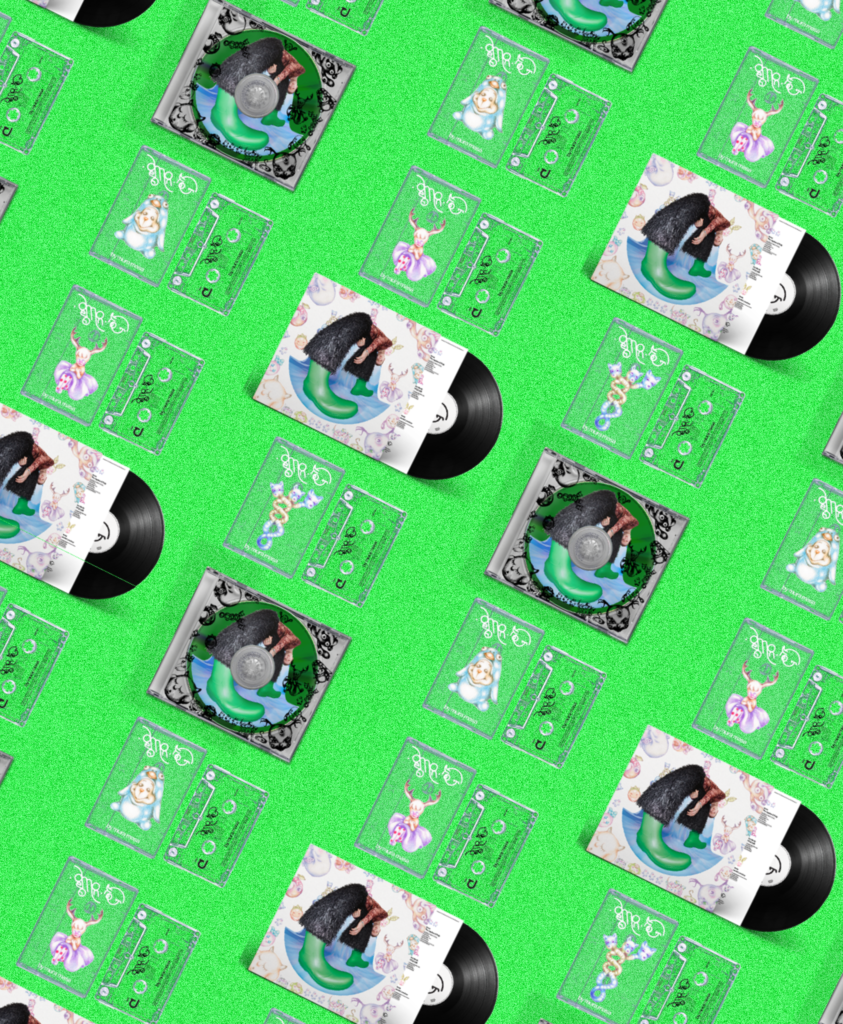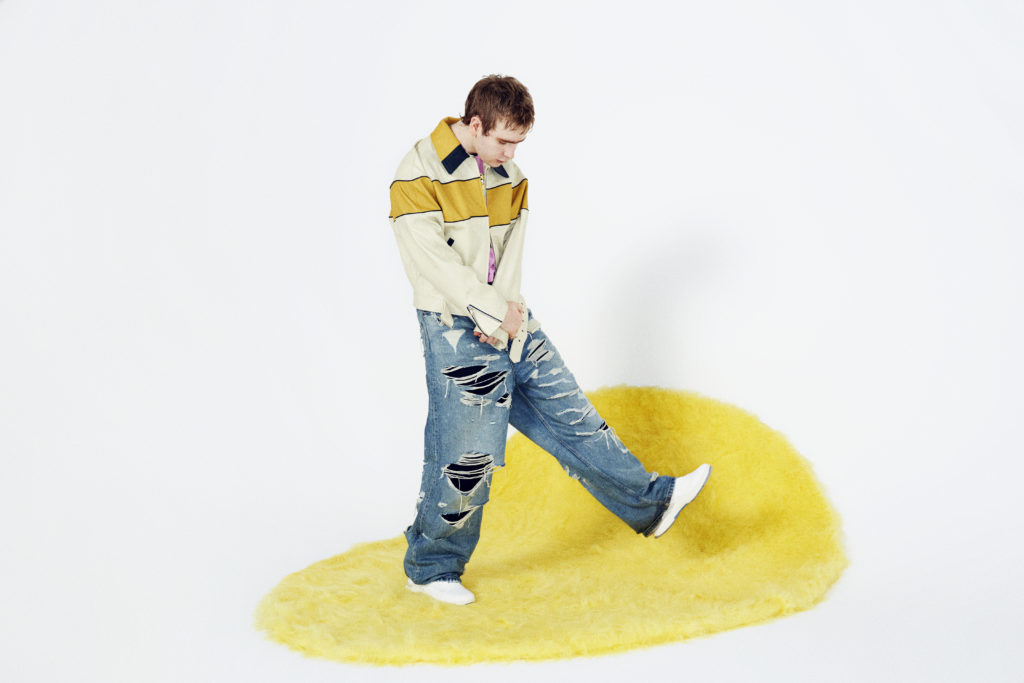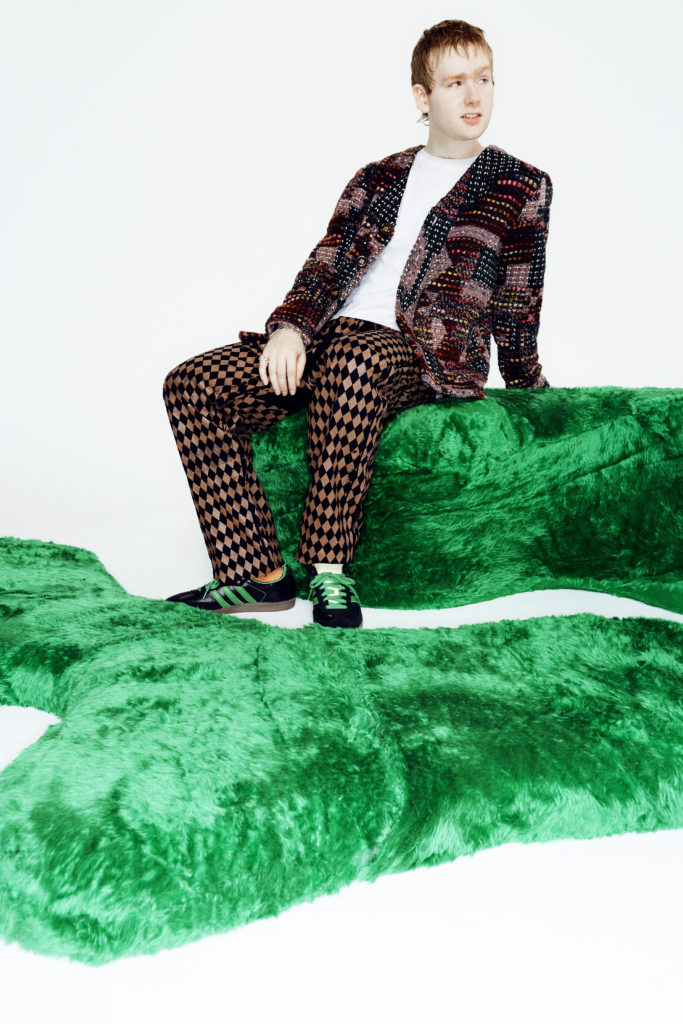Publishing date: Oct, 05, 2022
“I find it hard to answer the question what kind of music do you make? I always say I guess it’s like pop music but what I’m really trying to do is meet people halfway and go into their world a little bit and bring them into my world a little bit,” says Alex Crossan, professionally known as Mura Masa, about his ethos that informs collaborating with artists across different genres. The result is an open-ended answer that boils down to—Crossan can make any music he damn well pleases. Proven by his discography, spanning variance in sounds and styles as much as featured artists, to which he just added his third studio album, demon time. “It was actually something Shygirl said to me, she introduced me to that idea of being on demon time and being up to no good,” Crossan says reflectively on the inspiration for the two-word title accompaniment to the purple devil emoji. “I thought it was a good reason to write music during the pandemic because we were all robbed of a lot of joy and hedonism. Instead of trying to make music that reflected the grief of that loss I wanted to make music for the future when we’re allowed to be together again, that seemed much more interesting.”
Appropriately timed for release at the end of summer (when bad decisions are in abundance), demon time soundtracks the 1-5 am time of mischief before partygoers cross paths with early morning go-getters. In typical Mura Masa fashion, there is no singular sound to demon time boasting features from Shygirl, Pa Salieu, Skilllibeng, Lil Uzi Vert, PinkPantheress, slowthai, and more. In lieu of genre, there’s a collective spirit and energy to the album that evokes the feeling of wanting to let loose, have fun, and make decisions that are for the plot. If you listen closely, demon time tags are scattered throughout the album. Whether it’s Shygirl’s mischievous laugh followed by “mura” in “bbycakes”, the unidentified “jesus christ” in multiple songs, the automated “number you have dialed is not in service” in “up all week” or the custom Pa Salieu “Mura Masa, dey give ‘em di energy” in “blessing me”. Altogether, it sounds like the footprints of cutesy demonic characters, illustrated in the album artwork and merch, running amok throughout the 11-track record.

The absence of a singular producer tag is also telling of Crossan’s unrestricted approach to creation, his signature lies in the nuances instead. “I feel like [there’s] stuff you do as a producer or an artist that you can’t help and that’s always going to be informing what your signature sound is,” he says pondering the cohesiveness that separates his music from a featured artist’s individual work. “It’s about being a huge fan of a person’s work in the first place, seeing an opportunity for them to try something new, and then curating that in a way that’s interesting for everybody involved and that is the sound. It means I end up with these albums that don’t really have a genre to them,” he concludes.
Crossan saw an opportunity while making “Blessing Me”, an undeniable hit from the album fusing Afrobeats, Rap, and Dancehall, to curate something compelling with two artists he liked. “Collaborating with anyone, for a producer, [is] about creating a fun stage for them to try something new or show how talented they are. I was trying to do that when me and Pa [Salieu] originally had the session—create something fun that he could go nuts on. He was improvising a lot over that beat and then I chopped it up into a hook.” As the song started to take shape, another idea came to mind. “I’ve been a fan of [Skillibeng] for probably a year and a half now, and I was waiting for the right opportunity to reach out to him to work and this felt like the exact right beat. He killed it and ended up making a viral TikTok moment out of it which is my first experience with that as well,” Crossan explains, giving an example of his 3-step framework coming to fruition. Aside from TikTok virality, which has become a benchmark for music popularity nowadays, the sheer number of times I’ve heard “Blessing Me” played in a club since it was released in May indicates high replay value—another common criterion amongst fans.
Although audience and industry opinions weren’t top of mind while creating demon time, focusing on what Crossan internally wants and not what others want from him is something he’s been grappling with since the success of his 2017 self-titled debut album. This time around, he kept things streamlined with one word as the focal point—fun. “I really struggled with that my whole career and writing this album is a knee-jerk response to that. It’s more of an experiment, what happens if I don’t think about the end outcome at all and just focus on the concept and following that idea. It’s a singular question you can refer back to—is it fun? Is it fun to put PinkPantheress and Lil Uzi Vert on the same track? Yes, so let’s do it.” The track Crossan’s referring to, “bbycakes”, is a drill flip of 3 of a Kind’s 2004 hit “Baby Cakes”, also featuring Shygirl. It’s a beat he made in 20 minutes making it the antithesis of the “overly anxious” or, as they say in the UK, “deeping it” headspace he wanted to overcome.
“As I get older, as an artist, I’ve realized that the real trick to longevity with being creative is trying to tap back into that child-like abandon. You shouldn’t be overly worried about what your work says about you or comparing it to your previous work. You should constantly be trying to tap into that zen state of not thinking about it too much because those are the best ideas—the ones that don’t take as long.” Said zen state is always easier to achieve at the beginning of an artist’s career when the only pressure present is the pressure they put on themselves. Reflecting on where he was in his life while creating the album that launched his career, Crossan says, “I was at college, smoking a lot of weed and eating a lot of pizza, and I was very sad because my longtime girlfriend had just broken up with me.” He laughs lightheartedly admitting she was right to do so before continuing. “I was heartbroken and I wasn’t doing my college courses or attending class. Music was a reckless escape from the realities of what I was feeling and obviously, something about that resonated with people because off the back of that first album I was able to get a record deal and that was me falling into music.”

Photographed by Lillie Eiger
There’s a carefree essence to obscurity that became obsolete when Crossan released Mura Masa earning himself a Grammy nomination and a coveted spot at Coachella. The heavyweight features on the album—A$AP Rocky, Charli XCX, and Damon Albarn to name a few—combined with his ability to bring out the best in collaborators, meant all eyes were on him from that point forward. “[For] the second album I made an active decision to eschew people’s expectations and not allow myself to be pigeon-holed. I did that by following what I was passionate about at that time which was guitar music, punk music, and subversive attitudes in music,” he says of his sophomore album, R.Y.C., released in 2020. “I was looking inwards and not trying to one-up myself [with] what I did on the first album. In a way that relieved a lot of the pressure because I didn’t have to pretend [R.Y.C.] was better than the first album. It was so different, they’re almost incomparable.”
Reviewers did try and compare nevertheless but the odd bad review missed the point that Crossan was making—he won’t spend the rest of his career putting out iterations of his first album. “That was a big time of exploration for me and teeth-grinding nervousness about have I just fucked up my entire career but actually, it did the opposite. It freed me up to do whatever I [wanted] and that arrives us nicely at demon time which is me doing whatever I want,” he says with a smirk bringing our trip down memory lane to an end. While his second and third albums appear to be the genesis of the same solipsistic inward journey, the headspace he was in for each couldn’t be more different. “[demon time] is me following what I want to do because I believe in it, regardless of audience expectations, and there’s real confidence to this one. I feel like I’ve come into myself and hit my stride, not just in terms of production and technical music things but knowing my place in the music scene. [I’m] embracing my role as a [weird] curatorial Gen Z Warhol-type dude who’s just out and about working with a lot of people.”
The appropriately titled role of curator encompasses much of what Crossan accomplished on demon time—handpicking the sounds, tags, vocals, songwriting, collaborations, artwork, and overall vibe. As for what catches his curatorial eye, it’s quite simple. “I’m looking for something that’s genuinely exciting to me, whether it’s what they’re doing is really unique or they’re doing what they’re doing far above and beyond anybody else in their field. The main thing is envelope-pushing, there has to be something original about what they do it just can’t sound like something else,” he says frankly. Much like his genre-splicing sound, he doesn’t have a sequential approach to collaboration with other artists. “It really depends from person to person and in that sentence can be the key which is you have to be adaptive to people’s needs and what they want to do. I think it was pinkpantheress that said Alex always takes you out on a date before the session,” he recalls pausing to laugh. “I always do, we go for dinner or coffee and we spend at least half the time chatting. It’s like an empathy thing where you have to be set up to tap into where that person is at that moment.”

Photographed by Lillie Eiger.
At first glance, Crossan’s talent seems to lie in his direct involvement, he’s the glue that binds featured artists and sounds together, but his next project takes his U.K. Warhol curatorial role from a micro to a macro level. He’s creating his own studio space, partially inspired by his desire to have a designated space for himself, friends, and collaborators, and the realization that if what he wants doesn’t already exist, he should do it himself. “But then also wanting to do something that existed outside my own career or things that reflect on my ego, [and] takes on the mantle of something more important than the furtherment of my music career,” says Crossan nobly. “Aesthetically and design-wise, the emphasis is on socializing and opportunities for people to cross paths in hallways or in social areas. All the studios face each other onto a big communal center space, there’s a kitchen area, lots of seating, and areas of rest—almost where the emphasis isn’t on work it’s on that social aspect of creative work,” explains Crossan. The space couldn’t be more optimized for his method of creation, subtly encouraging studio goers to converse, emphasize, have fun, and tap into that zen state. “I’m really excited to see what kind of people cross paths in those social areas and what kind of ideas are generated from having that more relaxing low-pressure environment.”
Collaboration can organically lead to mentorship, but Crossan’s not leaving that up to chance. “At least one of the rooms is going to be reserved on a rolling residency basis. It’ll be available free of charge for a local Peckham or South London artist to come and have access to a space that they might not have otherwise. Not just the space [and] equipment but being in an environment with a lot of creative people who have advice or opportunity to give,” says Crossan in his philanthropic curatorial bag.
Much has changed for Crossan since his college days and the inception of Mura Masa, but as he continues to move forward, holding onto the creative essence of child-like abandon, he’s also learned to let go. “I think I suffer from classic [ambition] which is just constantly moving goalposts. It’s like you think the goal is to win a Grammy and then I won a Grammy and I was like yea but it was for a remix, I want to win one for my own music,” he says laughing at the fact that the goal changed as soon as he scored. “It’s something I’ve worked on in therapy a lot because if you live like that, you’re never going to feel any sense of achievement. I’ve only ever really felt successful recently in letting go of that idea and being satisfied with whatever it is that’s happening right now. Whether it’s classically defined wins like successful tracks or big shows or internal satisfaction [like] I’m really happy with this album that I made and that can be the end of it.”
Like what you saw? Here’s more:
AJ Tracey Has No Regrets
Lolo Zouaï Is Ready to Chat: Musical Soulmates, Fashion & IDGAF Ethos
Inside Sofi Tukker’s Colorful & Positive World of ‘WET TENNIS’

